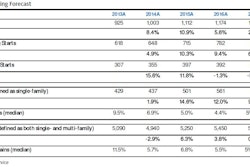The Trump Administration’s budget blueprint for fiscal year 2018 would significantly widen the public transportation sector’s $90 billion capital investment gap by ending approvals for certain types of grants, according to a new report by Moody’s Investors Service. The proposed budget blueprint would eliminate approvals for new grants in capital programs representing one-fifth of federal transit funding.
"The federal government is the most important source of capital funding for mass transit enterprises in the US, and most transit systems would be challenged to fully fund their programs with lower federal support. Many new projects likely would never proceed, and mass transit enterprises would struggle to fund ongoing expansions," says Dan Seymour, author of the report and Moody's Vice President.
In addition to providing roughly 42% of mass transit capital funding, the federal government also provides some operating grants, representing 8% of total operating expenditures. Mass transit systems rely heavily on subsidies and are not self-supporting. Farebox revenues account for 36% of operating costs, with subsidies or taxes covering both the remainder of operating expenses and 100% of capital expenses.
The report, "Mass Transit -- US: Proposed Federal Budget Would Compound Mass Transit Capital Funding Shortfall", notes if the current budget proposal is enacted, mass transit systems would struggle to replace federal funds, most likely through higher fares or more state and local government subsidies.
Even at current spending levels, an estimated $90 billion backlog of capital projects to preserve existing transit infrastructure will grow to $122 billion by 2032. Moreover, ridership peaked two years ago, with most rated mass transit systems reporting declines in FY 2016.
"A decline in federal capital funding coinciding with a decline in ridership would be a very difficult combination of pressures for mass transit systems to overcome," says Seymour.
Any cuts in federal spending to transit funding could also affect grant anticipation revenue bonds (GARVEEs), since the offerings are secured by future federal transportation grants.
"The budget blueprint does not immediately imperil any transit GARVEEs Moody's rates because the proposed cuts are in programs for grants that do not directly secure any currently outstanding GARVEEs," Seymour says.
Mass transit bonds secured by local sales or payroll taxes are more insulated from federal cuts since debt payments must be serviced before excess revenues flow to the transit systems.

















